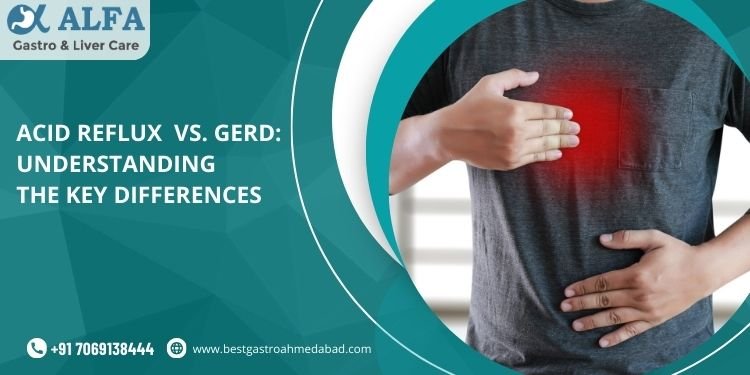Understanding the Contrast Between Acid Reflux and GERD

What Is the Difference Between Acid Reflux and GERD?
Acid reflux and GERD (gastroesophageal reflux disease) are two terms often used interchangeably, but they represent distinct conditions with differing implications for health and treatment. Understanding the disparities between them can help individuals navigate their symptoms more effectively and seek appropriate medical care when needed.
Acid Reflux:
Acid reflux, also known as heartburn, occurs when stomach acid flows back into the esophagus. This backward movement happens due to a weakening of the lower esophageal sphincter (LES), a muscular valve that normally prevents stomach contents from regurgitating into the esophagus. Common triggers for acid reflux include certain foods, beverages, lying down after eating, and being overweight.
Symptoms of Acid Reflux:
- Burning sensation in the chest (heartburn)
- Regurgitation of sour or bitter-tasting fluid into the mouth
- Difficulty swallowing
- Chronic cough
- Sore throat
GERD (Gastroesophageal Reflux Disease):
While acid reflux is a common occurrence for many people, GERD is characterized by persistent and severe acid reflux episodes that occur more than twice a week. GERD often leads to complications such as esophagitis (inflammation of the esophagus), Barrett’s esophagus (a precancerous condition), and esophageal strictures (narrowing of the esophagus). Chronic GERD requires medical intervention to manage symptoms and prevent complications.
Symptoms of GERD:
- Frequent heartburn
- Chronic cough
- Hoarseness or voice changes
- Asthma-like symptoms
- Difficulty or pain with swallowing
Key Differences:
Frequency and Severity: Acid reflux is occasional and mild for most individuals, while GERD involves frequent and persistent symptoms that can significantly impact daily life.
Complications: GERD increases the risk of developing complications such as esophagitis, Barrett’s esophagus, and esophageal strictures, which are not typically associated with simple acid reflux.
Treatment Approach: Acid reflux can often be managed with lifestyle changes and over-the-counter medications, whereas GERD may require prescription medications, lifestyle modifications, and in severe cases, surgical intervention.
Treatment Strategies:
Lifestyle Modifications: Avoiding trigger foods, maintaining a healthy weight, not eating close to bedtime, and elevating the head of the bed can help alleviate symptoms of both acid reflux and GERD.
Medications: Over-the-counter antacids, H2-receptor antagonists, and proton pump inhibitors (PPIs) can provide relief from acid reflux symptoms. For GERD, stronger medications like prescription-strength PPIs may be necessary to control symptoms and prevent complications.
Surgery: In cases where medications and lifestyle changes are ineffective, surgical procedures such as fundoplication may be recommended to strengthen the LES and reduce acid reflux.
Conclusion:
While acid reflux and GERD share similar symptoms, their frequency, severity, and potential complications set them apart. Understanding the difference between these conditions is crucial for effective management and prevention of long-term complications. If you experience persistent symptoms of acid reflux or GERD, it’s important to consult a healthcare professional for proper diagnosis and personalized treatment.
Contact Alfa Gastro and Liver Care and consult with Dr. Vatsal Mehta for expert guidance on Acid Reflux and GERD.
